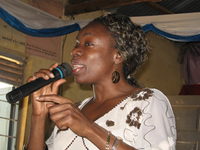A Trip to Iganga
Privatization of education appears to be a prominent government goal. I visited Rachel Magoola at her school in Iganga, about 40 miles north of Kampala over the weekend. The school is called Menya Ziabamuzali Primary school. They have about 160 boarding students on a lovely campus in a rural area. Lots of space, trees, grass. The privately owned school is establishing its own private teacher training college...the second or third in the nation. They’ll recruit secondary school grads and train them in the months while school is on break, and when the primary school is in session they’ll do their student teaching right there. MZPS got a bank loan and I ‘m guessing government support to start the training college. They’re building new dormitories and classrooms for the college which will open next year.
I was invited to come to MZPS for the P-7 farewell ceremony. The p-7’s had finished all their course work and were getting ready for national exams that would decide which secondary school…a big career determiner…they would be going to. I went up on Friday in the Post Bus that left from the main post office. The trip took four hours on one of the most battered and heavily under construction roads I’ve ever seen. It was stop and go all the way, dust and diesel exhaust. Friday night Rachel and I walked through Iganga on the busy main street and sat until late in the evening hotel drinking cokes (me) and Guinness (Rachel,) and watched the bustling nightlife from a hotel veranda.
The farewell ceremony the next day was interminable, but the graduates took it all in good humor and spirits were very high. We drove back to Kampala the next day in Rachel’s car and stopped so I could see the source if the Nile at Jinja. Jinja is a beautiful little town right where the Nile flows out of Lake Victoria. They have tour boats and concessions and along the road you can see some of the elegant old homes of the British colonialists.
A Business Plan
Monday night I helped Olivia, one of the university students at Kisa, with her business plan. She’s entering a contest and was looking for ideas, so I suggested an advertising agency to place display ads on the 10,000 minivan-taxis the clog the streets of Kampala 24 hours a day and are really the only reliable way of getting around except for the motorbike taxis that require a degree of faith and fatalism I have not been able to muster.
Olivia embraced my idea, and together we worked out a skeletal plan envisioning huge profits for the agency after 5 years. I tried to think of an enterprise that would combine saving the world with making money, but couldn’t come up with one. Maybe I’m just infected with the scrambling free-for-all business atmosphere here. I helped her with editing and showed her how to make a simple spread sheet. She turned in her proposal today.
My P4 and P5 Classes
I have a P4 class with over 50 students and a P5 class with about 33 students. Guess which one I like better. In P5, I feel I’ve been able at some point to engage the attention of every child. In P4, there are vast rows of desks in the back of the room where the students scarcely know I’m standing up in front. The P5’s are good participators; and volunteer for reciting and performing, though I unintentionally reduced one little boy to tears trying him to get his chin up and his voice audible as we went through a little public speaking exercise this morning. In P4, getting some of the kids to stand up and speak audibly was like trying to pull rusty nails with a salad fork. Especially the girls. These gigantic 12 and 13 years old speak in almost inaudible whispers, with their chins tucked way down in their chests, their hands covering their mouths... edging back to their seats the whole time.
In P5, we’re going to put on a play that Rachel wrote and gave me a copy of. It’s a nice little 15 minute 3 scene deal about a girl running away from home. The P4’s, I think I’ll keep teaching the songs…they like it and at least almost everybody participates at a minimal level. I just taught them Dark as a Dungeon by Merle Travis. Before starting the song itself, I passed out the words and we had a discussion of some of the unfamiliar words…dungeon, dew, labor, fellows, coal, mine, miner, fiend, dope, lust, are a few they didn’t know; and on the possible meaning of the song. That took almost a whole hour.
So I hope at the end of the term, The P5’s can put on their play and the P4’s can put on a musical program that will include Dark as Dungeon, Mill Was Made of Marble, Mail Myself to You, If I had a hammer.

2007-11-03 - Walking home on Hoima road one day last week, I passed this guy who appeared to be carrying a large ship model. After a quick doubletake, I realized it was a musical instrument…some kind of harp. I talked for a few minutes, and he offered to play me a song for 500 shillings. I unhesitatingly accepted his offer. He turns out to be a charming guy with a crooked, winning smile a gravelly voice, and a very energetic performing style. His name is Paulo Kasumba. The instrument is an udungu. The sound box is made of wood with an animal skin covering, and a long neck coming out of the box. From neck to tail it’s about 5 feet long. The wooden body has dozens of pieces of metallic junk attached to it… old suitcase handles, bent nails and appliance name plates. Some are for sound (they rattle, clatter and jingle) some for handling (the suitcase handles) and some are just for looks. It has ten tunable strings, each tuning peg is fancifully unique, and the body and neck are painted. I dragged him back to my room with me so I could record some of his songs and take some pictures. I asked him if he would sell the instrument or make me one. He offered to make me a similar one for USh 300,000 (about $175) or to sell me that one for USh 600,000. Dennis the concierge at the motel warned me the guy could be a charlatan, and not to give him any money, but I gave him USh 10,000 to buy materials and he said he would come back in a week and show me a prototype. I didn’t know if I would ever see him again, but he came back exactly a week later as he said he would, and said he’d rather sell me the original, because it would take too long to make another one, and he needed the money. I said fine, got the money out of the bank the next day and we completed the transaction. I’m now the proud owner of a handcrafted, genuine, Ugandan udungo.
About two weeks later, Paulo turned up at my place again with his new udungo which he had just finished building. He was back on the job as an itinerant musician. His new instrument is a structural twin of thye one I bought from him but mine is much cooler looking I think. Paulo gave me some lessons and showed me the tuning. Then I asked him to perform for my P4’s who were meeting in a few minutes. The other teachers were kind of appalled, I think, but the kids loved him and stamped and cheered at his songs. He totally charmed them, just as he charmed me.
Listen to Paulo's Songs
From Graeme Brown, Orphir, Orkney:
Great to hear from you, Tom, and thank you SO MUCH for your journal with the superb pictures and music, and thought-provoking reflections. It has been wonderful to be able to listen to the music and to feel myself back in Africa again. I am very intrigued by what you wrote about Ugandan capitalist society. I personally feel very uneasy about good education being left to the private sector. I guess the poor are left with very poor education, if they get any at all. However, when I read what you wrote about Makerere, I recognise that it may be beyond the capacities of the state or the university at this stage to organise good public education and perhaps this is the only way in which education can be organised at the moment. It takes time to learn the skills of organisation required for good educational institutions, or, indeed, for good government! We in the so-called developed world are still struggling with this! When we worked in Nigeria, I discovered how enterprising the people were. Capitalism thrived. When we worked in South Africa during the apartheid era, nobody was allowed to trade on the streets as this undercut the vested trading interests of the (largely) white trading sector. This all changed when freedom came. A South African friend, Margaret Legum, a first class economist, but one with a profound sense that the present form of the capitalist system is not working in that country, has urged the present government there to introduce BIGS, Basic Income Grants, a regular grant of money made to every citizen to enable folk to begin to trade in a small way, as they do in Uganda, and, thereby, to get the local economy moving and to give poor people a chance to improve their lot. The real problem is shortage of available resources for folk to start to trade. She also urges, incidentally, that South Africa should now do what every other strong emergent country (China, India, Korea, Taiwan, Chile) has done and close its borders to the outflow of capital and force capitalists to invest in
South Africa. This makes huge sense in the South African context. Again, it allows the capital resources, generated locally, to be made available to the local people and not to be exported for investment in the United Kingdom or the U.S.A.She also urges the introduction of a Tobin Tax on any capital which does flow from country to country, the money from which could be used to aid developing countries. So, while she reckons that we have to work within a capitalist system, it needs radical overhaul. I think that this is where I am also at the moment.
Lastly, in regard to private education in Uganda, the churches, though private, have some experience in this field, and should be doing something to draw poorer children into a good education system. I hope that they are.
|


